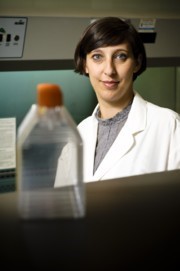
Since completing her research fellowship at the Mount Sinai School of Medicine in 2009, Dr. Mubareka has continued to study themes of viral transmission and spread through three research lines of inquiry:
- In vitro and in vivo experimental bioaerosols emitted by naturally-infected hosts to explore the determinants of bioaerosol generation and survival. In collaboration with engineering colleagues and others, Dr. Mubareka has been closely involved in building facilities to model particle velocities from coughs, characterize polluting particulates-virus interactions and determine microbial contaminants of medical air systems.
- Through an occupational health lens and as part of the University of Toronto’s Centre for Research Excellence for Occupational Disease Biohazards group, Dr. Mubareka has conducted studies examining bioaerosol generation by patients with laboratory-confirmed influenza.
- In close collaboration with animal health colleagues at the University of Guelph and the National Centre for Animal Diseases (NCFAD), over the past 3-4 years Dr. Mubareka has focused on pathogen emergence, incorporating the characterization of influenza virus bioaerosols generated by swine in agriculture with genomics. Dr. Mubareka was also recently funded for arthropod vector-borne work in collaboration with the National Microbiology Laboratory (NML) and the Public Health Agency of Canada (PHAC) by PHAC’s Infectious Diseases and Climate Change fund, and to examine coronavirus transmission among Canadian bats (NSERC), incorporating behavioural, biological, ecological and epidemiological considerations.
In the early days of the COVID-19 pandemic, Dr. Mubareka and colleagues isolated the SARS-CoV-2 virus in a Level 3 containment facility. It is now the principle source of SARS-CoV-2 to most academic CL3 laboratories across the country.
Dr. Mubareka serves on the Chief Science Advisor of Canada’s COVID-19 Expert Panel, the Implementation Committee of the Canadian COVID-19 Genomics Network (CanCOGeN) Viral Sequencing Project (Genome Canada) and the Ontario Genomics’ Steering Committee for the Ontario COVID-19 Genomics Rapid Response Coalition. She is also the Chair of the Ontario Academic Health Sciences SARS-CoV-2 Sequencing Network (ONS2). She has collaborated extensively with fluid dynamics engineers and others to fill gaps in the understanding of viral bioaerosol dispersion.
In 2020, Dr. Mubareka formed the Sunnybrook Translational Research Program for Emerging and Respiratory Viruses (SERV) to focus on viral genomics, transmission and the development of medical countermeasures.
